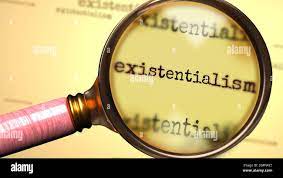In the 21st century, the existence of man has been a subject of profound contemplation. The world has evolved at an unprecedented pace, with technology and science shaping our lives in ways unimaginable in previous centuries. Yet, amidst this whirlwind of progress, the fundamental questions about human existence remain as pertinent as ever. To explore these questions, we turn to the philosophical insights of Fyodor Dostoevsky, Jean-Paul Sartre, and Albert Camus.
Dostoevsky, a Russian novelist of the 19th century, was renowned for his exploration of psychological depths. His works often grappled with existential themes such as morality, free will, and the nature of suffering. In his magnum opus “Crime and Punishment,” he delves into the psyche of Raskolnikov, a man who commits a heinous crime in an attempt to assert his superiority over moral law. This narrative resonates with the 21st-century man who often finds himself at odds with societal norms and expectations.
In this era where individualism is celebrated yet paradoxically constrained by societal pressures, Dostoevsky’s exploration of personal freedom and moral responsibility is particularly relevant. The 21st-century man often grapples with the dichotomy between personal desires and societal expectations. This struggle is reminiscent of Raskolnikov’s internal conflict – a testament to Dostoevsky’s timeless insight into human nature.
Sartre’s existentialism offers another lens through which to view the human condition in the 21st century. His philosophy posits that existence precedes essence – that we are born without a predetermined nature and it is up to us to define our essence through our actions. In an age where identity is fluid and self-definition is a continuous process, Sartre’s philosophy resonates deeply.
The 21st-century man is often confronted with a multitude of choices and possibilities. This freedom, while liberating, can also be overwhelming and lead to a sense of existential angst – a concept Sartre explored extensively. The idea that we are condemned to be free, that we bear the responsibility for our actions and their consequences, is a poignant reflection of the human condition in the modern world.
Lastly, we turn to Camus, whose philosophy of absurdism provides a unique perspective on human existence. Camus posited that life is inherently meaningless and absurd, yet it is up to us to create our own meaning. In “The Myth of Sisyphus,” he uses the Greek myth as a metaphor for the human condition – endlessly pushing a boulder up a hill only for it to roll back down, symbolising the futility and repetition inherent in life.
In the 21st century, where life can often seem monotonous and devoid of purpose, Camus’ philosophy offers solace. It encourages us to embrace the absurdity of life and find joy in the struggle itself. The 21st-century man, much like Sisyphus, can find happiness in his toil if he accepts life’s inherent absurdity and continues to push his boulder with courage and conviction.
In conclusion, Dostoevsky’s exploration of moral responsibility, Sartre’s existentialism, and Camus’ absurdism provide valuable insights into the existence of man in the 21st century. Despite the rapid advancements in technology and science, these philosophical perspectives remain relevant as they address timeless questions about human nature and existence. As we navigate through this complex era, these philosophies serve as guiding lights illuminating our path towards understanding ourselves better.
